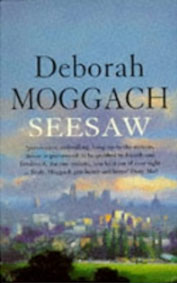Book review: Seesaw by Deborah Moggach
 Deborah Moggach is one of those authors I’ve seen recommended in many places over the last 20+ years. A few of her novels have been made into films (including These Foolish Things, which became The Best Exotic Marigold Hotel) and she has written several screenplays as well. So when a family member was having a book clearout and offered me her novel Seesaw I jumped at it. I will not be jumping at her books in future.
Deborah Moggach is one of those authors I’ve seen recommended in many places over the last 20+ years. A few of her novels have been made into films (including These Foolish Things, which became The Best Exotic Marigold Hotel) and she has written several screenplays as well. So when a family member was having a book clearout and offered me her novel Seesaw I jumped at it. I will not be jumping at her books in future.
It’s not that it’s a bad book. It’s easy to read, with complex characters and I was entertained. But it’s also fairly predictable, despite a structure that feels intended to surprise or even wrongfoot readers. And its commentary on class and money feels simplistic – very much the perspective of an upper middle class writer.
The story centres on the Price family – suburban middle-class folk with everyday, petty squabbles. They’re members of the rotary club. The younger children go to private school. They bought their oldest child a flat when he went to university and have promised him some very expensive film-editing equipment to kickstart his career. Both parents run their own businesses. They’re ordinary; dull, even.
Then their 17-year-old daughter Hannah goes missing. After a long, increasingly fraught day, the Prices receive a phone call claiming that Hannah has been kidnapped and demanding a very large ransom. They can afford it, but it’s going to clean them out of almost everything they have.
“Nobody spoke. Val’s heart thumped against her ribs. To phone the police made it official; it made it so concrete and terrifying that her throat closed up. The word police made real all the scenarios that up until now they could pretend they weren’t picturing. They would finally step over the border and leave normal families behind. Once he picked up the phone they would be caught up in the momentum of the official machinery and there would be no turning back.”
This is not a crime novel. It’s a family drama with a crime as the MacGuffin that sparks a change in circumstances. Which I guess is one reason why at this point the narrative switches back to Hannah and we meet her kidnappers. They’re a couple, Jon and Eva. Desperate for money, they hatched a plan that neither quite believed the other would go through with. Their gradually revealed backstory feels deliberately designed to make them sympathetic despite the fact they’re keeping a teenage girl bound and blindfolded in a shed.
Most of the novel takes place after Hannah returns home. It explores the fallout, not the crime itself. As the title implies, fortunes rise and fall. Both the Price parents and the kidnappers discover it’s not easy to remain a couple when your life changes beyond recognition.
I will admit, I struggled to care about the sacrifices the Price family are faced with to pay the ransom. I know they’re used to a certain life, and change is hard, but they come across as entitled assholes in the things they complain about. Which, in fairness, is probably realistic. If only the half of the novel about a working-class couple had been nearly as convincing.
I’m also unsure about the Jon and Eva dynamic, where she is painted as the money-grabbing mastermind, while he is just a nice guy who gets talked into doing everything Eva demands because he loves her.
I think maybe it all just felt a bit stale and of its time. Or perhaps I have just had enough of stories about entitled, rich people after 25 years of reading literary fiction.
Published 1996 by William Heinemann.